The Final Event: Opening Session
The end or a new beginning?
Almost 150 people gathered for on-site participation across three-day regional events which culminated in the EOSC-Nordic Final Event “The end or a new beginning” on the 5th of October 2022 in Tallinn, Estonia.
Welcome by Gudmund Høst, EOSC-Nordic Coordinator and Director of NeIC
Gudmund Host opened the welcome session, in which he resumed the achievements of the EOSC-Nordic project for the last 3 years. With a budget of 6 million euros, the EOSC-Nordic project aimed to establish the Nordic and Baltic countries as frontrunners in the take-up of the EOSC concept, principles, and approach. During its implementation, the program reached out to 24 partners, established and developed a network of 200 new partners in 10 countries.
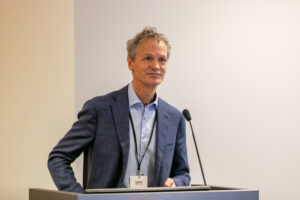
Image: Gudmund Høst. Photo by Gertrud Alatare.
The presentation available in the Knowledge Hub
The EOSC Tripartite Collaboration, Michael Arentoft, Head of Unit A.4 Open Science, European Commission, Directorate-General for Research and Innovation
On the importance of the EOSC Tripartite and Open Science, Michael Arentoft said that EOSC “enables the open sharing of knowledge and the re-use of research outputs.”
According to him, the unique collaboration between the European Commission, the European Member States and Associated Countries, and the EOSC association (the so-called tripartite collaboration) makes possible a bottom-up approach toward Open Science: from institutions to national bodies, European bodies and, ultimately, to the international ecosystem. In fact, the EOSC European partnership is about working together and offering added value to one another. EOSC tripartite collaboration aims to accelerate the EOSC and make it better.
With this regard, Michael Arentoft pointed out that there is still a lot to do to establish a functional EOSC starting from improving the way the European research landscape shares data: “We are not yet in the stage where data is shared openly. Approximately 60% of researcher data is stored in personal physical data storage or institutional local data storage.” – he said, when analysing the results of the European Research Data Landscape study 2022: How is data used and what are the practices? An additional challenge is linked to the way we manage data, as most of the data shared nowadays is not aligned with FAIR practices.
The research community also needs to overcome barriers such as lack of time, effort and financial resources for Research Data Management, as well as data protection and legal restrictions. “That is why EOSC is so important: to work on the incentives for researchers to share data and make them FAIR,” said Michael Arentoft.
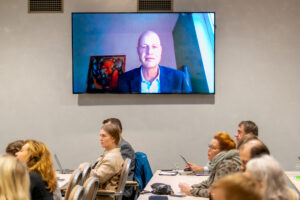
Image: Michael Arentoft. Photo by Gertrud Alatare.
The presentation available in the Knowledge Hub
EOSC as a web of FAIR data and services, Karel Luyben, EOSC Association President
Michael Arentoft’s presentation was followed by a keynote presentation by Karen Lyuben, EOSC Association President, in which he discussed the relevance of FAIR data and what are the necessary requirements to establish EOSC.
As he pointed out, the web of FAIR data will enable researchers to find relevant datasets easily. Europe is well positioned and prepared to deliver this, however, according to Karel Lyuben: “there are big challenges for developing EOSC, both technical and social. That is the reason why the overarching principle for developing EOSC is that research has to be at the centre of the EOSC initiative, he stressed.
With these challenges in mind, the EOSC Association President announced the agreed priorities for 2023-2024. Among them, the implementation of an operational EOSC Core, interoperability and data search, and improved quality of data.
In addition to these key action lines, Karel Lyuben stressed that EOSC is working towards improving country’s engagement, exploring funding and resourcing models for EOSC and working on the recognition rewards framework. His vision is clear: “If in 2040, the 50% of the relevant research data would be as FAIR as possible, my dream would come true” – said before closing his speech.
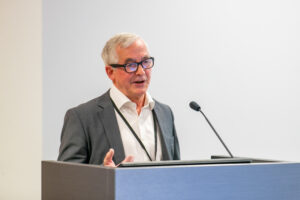
Image: Karel Luyben. Photo by Gertrud Alatare.
The presentation available in the Knowledge Hub
EOSC-Nordic impact, Lene Krøl Andersen, EOSC-Nordic Project Manager, International Liaison, Computerome
Luyben´s speech was followed by the presentation of Lene Krøl Andersen, Project manager at EOSC-Nordic and International Liaison at Computerome in Denmark, on the EOSC-Nordic impact. Lene Krøl Andersen highlighted the impact of EOSC-Nordic during the 3 years of project lifetime. Before delving into the results of the programme, she dedicated a special mention to the EOSC pioneers from the Nordics: scientists who have already adopted an EOSC mindset of sharing and using data across disciplines. Thanks to our EOSC pioneers, she said, “EOSC has provided its Proof of Concept amongst its users”.
Moving into the EOSC-Nordic key results, she emphasized the Nordic-Baltic infrastructure services and tools applicable for cross-border usage and the integration with the EOSC Future catalogue. EOSC-Nordic did also possess a strong dedication towards increasing the FAIR uptake in the region. The EOSC-Nordic FAIR team has in concrete terms increased the FAIR score for 98 repositories and trained over 300 data stewards across the Nordics. Also, EOSC-Nordic has had a significant impact on the regional consolidation of EOSC as well as the increment of cross-country and disciplinary collaboration, building upon the Nordic eInfrastructure Collaboration; NeIC.
During this journey of 3 years and great achievements, Lene Krøl Andersen admitted that the vision and mission of EOSC also faces challenges and obstacles when the real construction work sets in. However, she stressed that it is the natural path to success (also) for EOSC; “discovering what doesn’t work – learning by doing and by each other is how we become wiser together and is the right way to a successful EOSC”.
Before closing her presentation, she thanked the many collaborators of EOSC-Nordic, i.e. NeIC as the coordinating institution, the EOSC-Nordic Executive Board members, the International Advisory Board, the General Assembly, the EC and the EOSC Association and all other collaborators for their commitment and enthusiasm, agreeing that these 3 years of EOSC-Nordic have been “a fantastic journey”.
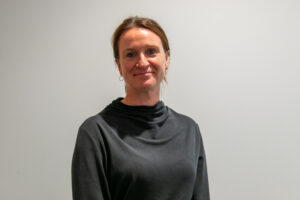
Image: Lene Krøl Andersen. Photo by Gertrud Alatare.
The presentation available in the Knowledge Hub
EOSC Engagement across stakeholders – panel debate
The session ended up with an active panel debate.
Chair and Moderator: Ute Gunsenheimer, EOSC Association Secretary General
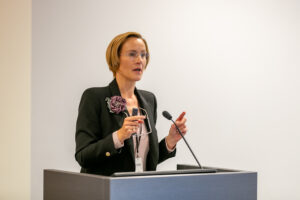
Image: Ute Gunsenheimer. Photo by Gertrud Alatare.
Panelists:
Gudmund Høst, EOSC-Nordic Coordinator, NeIC Director
Hans Eide, Special Advisor, Sigma2, Norway
Ivar Koppel, Head of HPC centre, University of Tartu / Estonian Scientific Computing Infrastructure (ETAIS)
Gitte Kudsk, Director of DeiC, Denmark
Vigdis Namtvedt Kvalheim, Director, Norwegian Centre for Research Data (NSD)
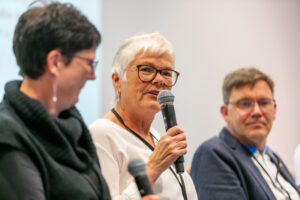
Image: Gitte Kudsk, Vigdis Namtvedt Kvalheim, Ivar Koppel. Photo by Gertrud Alatare.
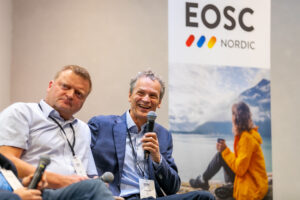
Image: Hans Eide, Gudmund Høst. Photo by Gertrud Alatare.
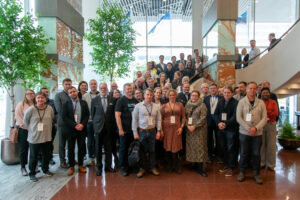
Image: Group photo. Photo by Gertrud Alatare.